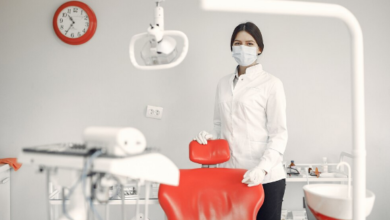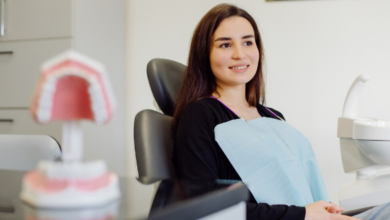Finding the Right Pediatric Dentist in Shawnee, KS: A Parent’s Guide

Choosing The Right Pediatric Dentist In Shawnee
Finding the right pediatric dentist in Shawnee, KS, is a really important step for your child’s oral health. It’s not just about finding someone who can clean teeth; it’s about finding a healthcare provider who can make your child feel comfortable and safe during dental visits. This sets the stage for a lifetime of good dental habits.
Qualities Of A Good Pediatric Dentist
When you’re looking for a good pediatric dentist, there are a few things to keep in mind. You want someone who is:
- Patient and Understanding: Kids can be nervous, so a dentist who takes the time to explain things and listen to their concerns is key.
- Experienced with Children: Pediatric dentists have special training in dealing with children’s dental needs, which are different from adults.
- Has a Child-Friendly Office: A welcoming environment can make a big difference in how your child feels about going to the dentist. Think bright colors, fun decorations, and maybe even a play area.
A good pediatric dentist isn’t just about fixing teeth; it’s about building trust and creating positive experiences that will help your child develop good oral hygiene habits for life.
Questions To Ask Your Child’s Dentist
Before you commit to a pediatric dentist, it’s a good idea to ask some questions. Here are a few to get you started:
- What is your experience with pediatric dentistry?
- How do you handle dental anxiety in children?
- What are your policies on emergency dental care?
- What sedation options do you offer, if any?
How To Prepare For The First Visit
Preparing your child for their first dental visit can make a big difference in how it goes. Here are some tips:
- Talk About It: Explain what will happen in simple terms. For example, “The dentist will count your teeth and make sure they’re healthy.”
- Read Books or Watch Videos: There are lots of resources available that show kids what to expect at the dentist.
- Bring a Comfort Item: A favorite toy or blanket can help your child feel more secure.
- Stay Positive: Your attitude can influence your child’s, so try to stay calm and upbeat.
Addressing Dental Anxiety In Children
It’s pretty common for kids to have some level of dental anxiety. The sounds, the smells, the unfamiliar equipment – it can all be a bit overwhelming. As parents, understanding and addressing this anxiety is super important for setting them up for a lifetime of good oral health. It’s not just about getting through the appointment; it’s about making them feel safe and comfortable.
Signs Of Dental Anxiety In Kids
Sometimes kids don’t come right out and say they’re scared. You’ve got to watch for the clues. Here are some things I’ve noticed with my kids:
- Sudden stomachaches, especially on the morning of the appointment. It’s like their body is trying to find a way out.
- Being extra quiet or withdrawn: If they’re usually chatty, but suddenly they’re not saying much, that can be a sign.
- Crying or clinging: Obvious, but still important. They might cling to you like a little koala bear, not wanting to let go.
- Refusing to go: This is the big one. They might flat-out refuse to get in the car or walk into the office.
Techniques To Alleviate Fear
Okay, so you know your kid is anxious. What can you do about it? Here are a few things that have worked for me:
- Talk about it: Before the appointment, chat with them about what to expect. Use simple, positive words. Avoid scary words like “pain” or “needle.”
- Read books or watch videos: There are tons of great resources out there that show kids what a dental visit is like in a fun, non-threatening way.
- Play “dentist” at home: This might sound silly, but it can help. Let them “examine” your teeth or their stuffed animals’ teeth. It makes the whole thing feel more familiar.
- Bring a comfort item: A favorite toy or blanket can make a big difference. It gives them something familiar to hold onto.
Creating a calm and supportive environment is key. Try not to transfer your anxieties (if you have them) onto your child. Speak positively about the dentist and the importance of taking care of their teeth.
The Role Of Parents In Managing Anxiety
Parents play a huge role in how kids feel about the dentist. Here’s what I try to keep in mind:
- Stay calm: Kids pick up on your emotions. If you’re relaxed, they’re more likely to be relaxed too.
- Be positive: Positively talk about the dentist. Focus on the benefits of healthy teeth.
- Listen to their concerns: Let them talk about what they’re worried about, and validate their feelings.
- Offer encouragement: Praise them for being brave and cooperative.
Understanding Sedation Dentistry For Kids
Sometimes, kids need a little extra help to get through dental appointments. That’s where sedation dentistry for kids in Shawnee comes in. It’s not something every child needs, but it can be a real lifesaver for those who are super anxious or have trouble sitting still. It’s all about making the experience easier and less scary for them.
What Is Sedation Dentistry?
Sedation dentistry uses medication to help kids relax during dental procedures. It can range from mild sedation, where they’re still awake but calm, to deeper sedation, where they might drift off to sleep. It’s not the same as general anesthesia, where they’re completely unconscious. The goal is to make them comfortable and cooperative so the dentist can do their job effectively.
Types Of Sedation Used In Pediatric Dentistry
There are a few different types of sedation that pediatric dentists might use:
- Nitrous Oxide (Laughing Gas): This is a mild sedative that’s inhaled through a mask. It helps kids relax and feel less anxious. The effects wear off quickly once the mask is removed.
- Oral Sedation: This involves giving the child a liquid or pill to swallow before the appointment. It makes them drowsy and relaxed, but they’re still awake.
- IV Sedation: This is a deeper level of sedation where the medication is given through an IV. It’s usually used for more complex procedures or kids with severe anxiety. The child is closely monitored throughout the procedure.
Benefits Of Sedation Dentistry
Sedation dentistry can make a big difference for some kids. Here are some of the benefits:
- Reduces Anxiety: It helps kids who are afraid of the dentist feel more relaxed and comfortable.
- Facilitates Cooperation: It makes it easier for the dentist to perform procedures, especially if the child has trouble sitting still.
- Pain Management: Some sedation methods can also help to reduce pain and discomfort during the procedure.
It’s important to talk to your dentist about whether sedation dentistry is right for your child. They’ll consider your child’s individual needs and medical history to make the best recommendation. They will also explain the risks and benefits of each type of sedation so you can make an informed decision.
The Importance Of Regular Dental Check-Ups
Regular dental check-ups are super important for kids. It’s not just about fixing problems when they pop up; it’s about preventing them in the first place. Think of it like taking your car in for maintenance – you do it to keep things running smoothly and catch any small issues before they turn into big, expensive ones. These visits are a key part of preventive care.
How Often Should Kids Visit The Dentist?
Generally, kids should see the dentist every six months. Some might need to go more often, depending on their specific needs. For example, if your child is prone to cavities, the dentist might recommend check-ups every three or four months. It’s all about keeping those pearly whites in tip-top shape.
What To Expect During A Check-Up
So, what happens during a regular dental check-up? Well, here’s a quick rundown:
- Exam: The dentist will take a good look at your child’s teeth and gums, checking for any signs of decay, gum disease, or other problems.
- Cleaning: A dental hygienist will clean your child’s teeth, removing plaque and tartar buildup. This is something you can’t do at home, no matter how well your child brushes.
- Fluoride Treatment: The dentist might apply fluoride to help strengthen the enamel and protect against cavities.
- X-rays: Sometimes, the dentist will take X-rays to get a better look at what’s going on beneath the surface. This helps them spot any hidden problems that aren’t visible during a regular exam.
Regular dental visits aren’t just about fixing teeth; they’re about teaching kids the importance of oral hygiene and setting them up for a lifetime of healthy smiles. It’s an investment in their overall health and well-being.
Building A Positive Relationship With The Dentist
Making sure your child feels comfortable with their dentist is a big deal. Here are a few tips to help build a positive relationship:
- Start Early: Begin taking your child to the dentist as soon as their first tooth appears. This helps them get used to the environment and the people.
- Talk Positively: Always speak positively about the dentist and dental visits. Avoid using scary words like “pain” or “needle.”
- Be Honest: Explain to your child what to expect during the visit in simple, age-appropriate terms. Honesty is the best policy.
- Choose the Right Dentist: Find a pediatric dentist who is experienced in working with children and knows how to make them feel at ease.
Encouraging Good Oral Hygiene At Home
It’s so important to start good habits early, and that includes encouraging good oral hygiene at home. It can be a struggle sometimes, but it’s worth it for your kids’ health.
Creating A Fun Brushing Routine
Let’s be real, brushing teeth can be boring. So, how do you make it fun? Here are a few ideas:
- Make it a dance party: Put on some music and dance while brushing. It gets the time to pass quickly!
- Use a timer: Get a fun timer, or use a phone app, so they know how long to brush. Kids love beating the clock.
- Let them choose their toothbrush: A character toothbrush or a cool color can make brushing more appealing.
The Role Of Diet In Dental Health
What your kids eat seriously affects their teeth. Sugary drinks and snacks are the enemy. Try to limit those and focus on healthier options.
- Offer healthy snacks: Fruits, veggies, cheese – these are all great for teeth.
- Limit sugary drinks: Juice, soda, and sports drinks can cause cavities. Water and milk are much better choices.
- Read labels: Be aware of hidden sugars in processed foods.
Teaching Kids About Flossing
Flossing can be tricky to teach, but it’s a must. Start early and make it a habit.
- Start young: As soon as teeth touch, start flossing.
- Make it a game: Use flossers that are easy for little hands to manage.
- Show them how: Demonstrate the proper technique and help them until they can do it themselves.
Establishing good oral hygiene habits early on is super important. It’s not just about preventing cavities; it’s about teaching kids to care for their bodies and understand the importance of a healthy smile. Make it fun, be consistent, and lead by example, and you’ll set them up for a lifetime of good dental health.
Finding A Pediatric Dentist That Fits Your Family
Finding the right pediatric dentist is super important. It’s about more than just teeth; it’s about finding someone who makes your kid feel comfortable and sets them up for a lifetime of good dental habits. It’s like finding the right pair of shoes – it has to be a good fit!
Researching Local Options
Okay, so where do you even start? Well, first, make a list of pediatric dentists in your area. You can use online search engines, ask friends for recommendations, or check with your insurance provider for in-network options. Once you have a list, start digging a little deeper. Here are some things to consider:
- Location: Is the office conveniently located near your home, work, or your child’s school? Nobody wants to drive an hour for a check-up.
- Office Hours: Do the office hours work with your schedule? Some offices offer evening or weekend appointments, which can be a lifesaver.
- Services Offered: Does the dentist offer all the services your child might need, like preventative care, restorative treatments, or even orthodontics?
Reading Reviews And Testimonials
Online reviews can be super helpful, but take them with a grain of salt. Everyone has different experiences, and what bothers one person might not bother you. Look for patterns in the reviews. Do people consistently praise the dentist’s gentle approach or complain about long wait times? Check out sites like Google, Yelp, and Healthgrades to get a well-rounded view.
Scheduling A Consultation
Don’t be afraid to schedule a consultation with a few different dentists before making a decision. This is your chance to meet the dentist, see the office, and ask any questions you have. Pay attention to how the dentist interacts with your child. Do they seem patient and understanding? Does the office feel welcoming and kid-friendly? Trust your gut – you want to find someone you and your child both feel comfortable with.
Choosing a dentist is a big decision. Take your time, do your research, and don’t settle until you find someone who’s a good fit for your family. A positive dental experience early on can make all the difference in your child’s oral health for years to come.
The Role Of Parents In Dental Health
Parents have a big part to play in their kids’ dental health. It’s not just about scheduling appointments; it’s about creating good habits and attitudes that last a lifetime. The keyword here is “role”, and it’s a significant one.
Communicating With Your Child About Dental Visits
Talking to your child about dental visits can make a huge difference. Here’s how to approach it:
- Before the visit: Explain what will happen in simple terms. Focus on the positive aspects, like how the dentist helps keep their teeth strong and healthy.
- During the visit, Stay calm and supportive. Let the dentist lead the conversation, but offer reassurance if your child seems nervous.
- After the visit: Talk about what went well. Praise their bravery and cooperation, and maybe offer a small reward for good behavior.
Setting A Good Example
Kids learn by watching their parents. If you want your child to have good dental habits, you need to show them what those habits look like. Here are some ways to lead by example:
- Brush and floss regularly: Let your child see you taking care of your teeth. Make it a family activity.
- Eat healthy foods: Limit sugary snacks and drinks. Show them that you value healthy eating.
- Visit the dentist regularly: Talk about your dental visits in a positive way. This helps normalize the experience for your child.
Involving Kids In Their Dental Care
Getting kids involved in their dental care can help them feel more responsible and motivated. Try these tips:
- Let them choose their toothbrush: A fun toothbrush can make brushing more appealing.
- Teach them how to brush properly: Show them the correct technique and supervise them until they can do it on their own.
- Use a timer: Make sure they brush for the recommended two minutes.
It’s important to remember that every child is different. What works for one child may not work for another. Be patient, flexible, and willing to adjust your approach as needed. The goal is to create a positive and supportive environment that encourages good dental habits for life.





